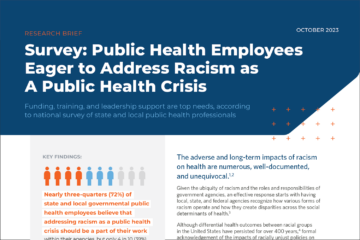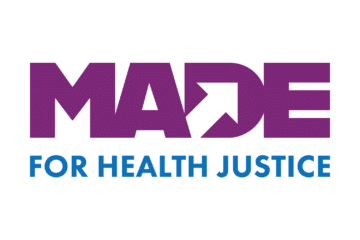Jamila Porter
40 Under 40 Class of 2019
Atlanta, GeorgiaDirector of Programs and Evaluation
Safe States AllianceBOLD SOLUTION: Jamila developed and ran the Pedestrian Injury Prevention Action Team Program, an initiative designed to strengthen multidisciplinary partnerships to enhance pedestrian safety at state and local levels. The program resulted in new and stronger partnerships across disciplines in each state, refined pedestrian safety interventions that met the needs of specific communities, and showcased the value of public health leadership in an area generally considered to be solely within the purview of transportation professionals.
Five Questions for Jamila

Jamila is at the Griffith Observatory in Los Angeles, which includes a public observatory, exhibit hall, and planetarium, and was built to make astronomy accessible to the public.
1. Who or what inspired you to enter the field of public health?
My grandmother was diagnosed with diabetes when I was a small child. When I would visit, she taught me how to help her with the daily activities of managing the disease, including organizing her medication and helping her to administer her insulin. Watching my grandmother fight a losing battle with this disease ultimately inspired me to pursue a health-related career; the idea of healing people was incredibly compelling to me. However, it wasn’t until I took an “Introduction to Public Health” class in undergrad that I started to understand that the best way to help people coping with diseases and injuries was to prevent them from occurring in the first place. Public health’s focus on root causes, equity, policy, multisector collaboration, and utilitarianism has always appealed to me and continues to inspire me to this day.
2. What are the greatest challenges you face I your public health work or area of focus?
One of the greatest challenges we face as a field is that we are suffering from a lack of applied policy impact and outcome evaluation research. And I mean “research” in the most practical sense. Policies by far have the greatest potential to impact and enhance public health. Furthermore, they are ubiquitous: policies that can impact health are being adopted everywhere – within organizations and workplaces, by city councils, by state legislatures, and of course, by the U.S. Congress. Unfortunately, evaluations of these policies – which can reveal whether or not they “work,” under what conditions they may be effective, and what unintended consequences they may have – often don’t take place. As a result, practitioners, decisionmakers, and policymakers are often proposing, adopting, and revising policies with limited evidence of what’s actually effective. Another significant challenge we’re facing in public health is the lack of long-term, sustainable funding to support our initiatives. It may take years to see meaningful changes in morbidity and mortality from a program or policy intervention, and these changes often exceed a five-year grant cycle or a four-year presidential term. It’s hard to get ongoing fiscal support for an intervention that likely works, but will take a decade or more to show significant and measurable change.
3. What would success in public health look like to you?
For me, success in public health would be positive and quantifiable improvements in the interconnected social structures that impact health. This includes dismantling institutional racism, creating economic equity and gender pay parity, improving educational outcomes for all children and adolescents, and creating safe and walkable communities. Public health = economic health = environmental health = educational health. If we can make real improvements in these upstream areas, we’ll ultimately see positive changes in population health outcomes.
4. What’s a story of experience that keeps you going, even when you’re feeling challenged?
As the descendant of people who were enslaved and have been historically marginalized, I often think about what they went through so that I could be where I am today. When I feel challenged, I think about how many people – not just those in my family, but also those across the globe – have or are enduring unimaginable challenges. I too have had to endure challenges, but I’ve also been fortunate in so many ways. I had wonderful parents, a great education, and the opportunity to pursue a career in a deeply meaningful field. Appreciating what I have and working every day to give back is what keeps me going. As the saying goes: “To whom much is given, much is required.”
5. As a kid, what did you want to be when you grew up?
Like any kid, I wanted to be a lot of things! The top three for me were a physician, an astronaut, and an environmentalist. While I happily traded in clinical health for public health, to this day, I love reading books and watching documentaries about cosmology, as well as visiting any planetarium that I can. I’m also a huge fan of the 1990s cartoon “Captain Planet and the Planeteers,” which always reminds me to reduce, reuse, and recycle.
Jamila Porter's Recent Writing


